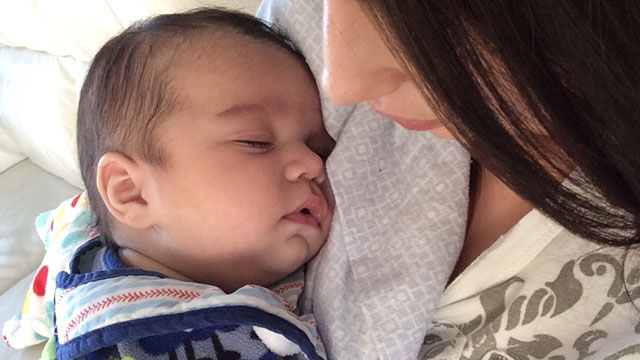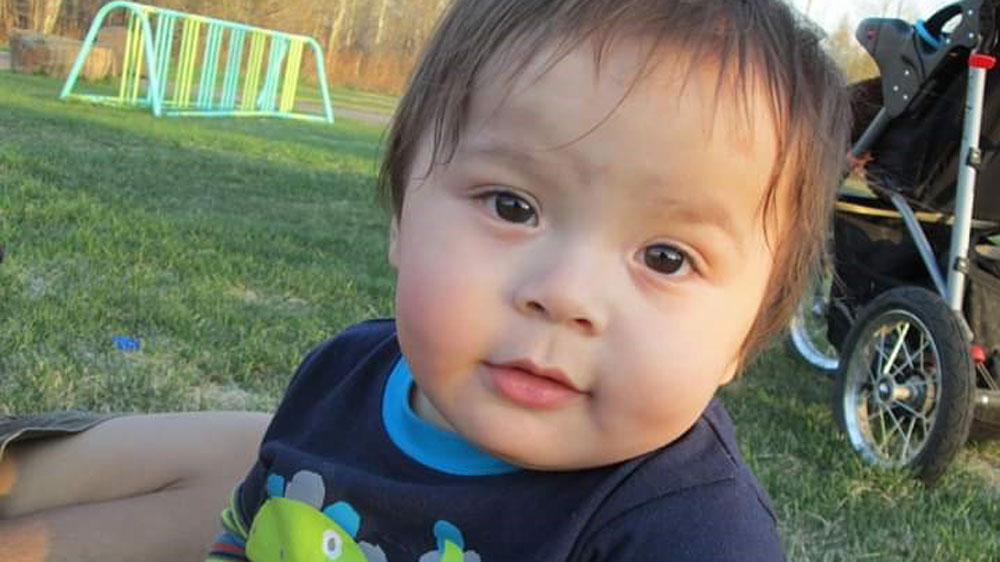
Breanne LeClair with her son Kyler. Submitted photo.

(Breanne LeClair holds her late son Kyler who died April 16, 2014 on a cluttered adult bed while in a kinship out of care agreement. Submitted photo.)
Dilico Anishinabek Family Care is demanding APTN News run corrections of a previously published story about the deaths of four babies saying incorrect information has defamed the agency.
However, APTN is refusing to do so based on the facts that follow.
Last June APTN published a story about four babies dying in care within seven months with one common theme: Dilico Anishinabek Family Care.
The information came largely from court documents and coroner records.
Prior to publication, APTN reached out to Dilico Executive Director Daria Borg with detailed questions about the deaths. No response was received.
A day before APTN planned to publish the story it reached out to Dilico one more time. This time, a response came.
“I would like to meet with you. Please contact me tomorrow to schedule a time that you could come visit Dilico in Thunder Bay,” Borg wrote.
APTN agreed to the meeting but pushed for a more immediate response to its questions.
“We are unable to comment or provide any further information beyond that which is publicly available, and already in your possession,” Borg responded. “Providing any further information would violate our legal obligations to protect the privacy of current and former employees, and of children in the care of our agency.”
The story ran the following day, on June 13.

On June 14 Borg emailed APTN saying there were inaccuracies in the story but that she couldn’t identify them due to confidentiality.
APTN asked for clarification around any specific errors, but Borg refused to back up her claim.
APTN considered the matter over.
Last week a lawyer representing Dilico sent a letter to APTN accusing the network of defamation based on the June 13 article.
In a recent feature article, Death as Expected: Inside a child welfare system where 102 Indigenous kids died in 5 years, APTN repeated the fact of four babies dying in seven months under the watch of Dilico between 2013 and 2014.
“Dilico is at a loss to understand why, after having been alerted to the fact that your June 13, 2019 report contains numerous inaccuracies, you would continue to rely on uncorroborated, imprecise, and ill-informed accounts of facts in order to further defame Dilico,” wrote Katherine Hensel, on behalf of Dilico, at 12:21 a.m. Sept. 27.
In June, Dilico did not particularize its claim about the alleged “numerous inaccuracies”. On Sept. 27, however, Hensel outlined what Dilico believed the mistakes to be.
First, Dilico zeroed in on the term “in care,” which APTN used in the headline. It involves the death of Kyler LeClair in April 2014, when his father left the three-month-old infant alone on a cluttered adult bed for at least 30 minutes. The coroner couldn’t confirm a cause of death. Kyler was in what’s known as a kinship out of care agreement.
Dilico was directly involved with Kyler’s placement by not allowing him to live with his mother, Breanne LeClair, who was living with her mother. The baby’s white father and the father’s mother signed the Kinship agreement.
The mom kept pushing for custody; she received a letter from Dilico before Kyler’s death.
“I am writing this letter to confirm that you are currently working cooperatively with Dilico Anishinabek Family Care on a service plan towards reunification with (Kyler),” wrote Mandi Merkley, the case manager on the file, on March 26, 2014.
Kyler died on April 16, 2014.
APTN has responded to Hensel’s letter saying that use of the term “in care” is justified as Dilico determined precisely where Kyler was living at the time of his death.
The next paragraph in Hensel’s letter was much shorter: “Furthermore, your speculation in your reports about a ‘fourth’ unidentified infant who purportedly died in Dilico’s care is unfounded as there is no such child.”
APTN responded to the lawyer, pointing out the unidentified baby comes from Dilico’s statement of defence in the wrongful dismissal case of former employee Lori Watts, filed in the Thunder Bay court in November 2014.
“In or about April 2014, an infant died while at one of the Defendant’s foster homes under the Plaintiff’s supervision,” said Dilico, but didn’t include any further information on this death.
APTN considered if this child could have been Kyler, as it is around the same time as the death mentioned by Dilico in the wrongful dismissal case.
But Dilico used terms in that case like “foster homes” and “supervision” suggesting that was formal care.
Using the argument Dilico is making over the definition of “in care” there had to have been a fourth baby, as foster care means “in care” according to Ontario law.
But there is much more to this.
APTN met with Borg Aug. 8, 2019 while in Thunder Bay interviewing mothers who had lost babies that had been taken by Dilico.
While filming the Dilico building, which is the largest building in the Fort William First Nation, Borg came out to talk to APTN.
She complimented APTN’s work and spoke of the issues they face trying to provide child welfare services.
APTN asked if the “inaccuracies” in the previous story was the definition of “in care,” but Borg shook her head declining to comment.
She instead spoke about her own past and the struggles Dilico deals with.
APTN told Borg people in the community fear Dilico and, asked her to come on-camera.
Borg said she would need to speak to her lawyer first.

(Daniel Issac Sabastein Quedent died June 13, 2014 in a Thunder Bay foster home. The coroner found evidence of an unsafe sleeping environment but a pre-existing heart problem was later found to be the cause of the death. Submitted photo)
Then on Aug. 29, 2019 APTN had a telephone conversation with Borg that was agreed to be off the record.
Emails continued over the next several weeks.
“Thank you for sharing this information,” Borg wrote on Sept. 11 after APTN provided some information that showed it had been underfunded by more than $167 million over six years compared to agencies in the south.
“I will be seeking approval from our board to respond to you. I will follow up after our meeting next Thursday. Take care,” she continued.
That was the last APTN heard from Borg or Dilico until the letter from Hensel.
The other baby APTN has been able to identify was Talon Nelson who died in a cluttered crib while placed in a Thunder Bay foster home Oct. 29, 2013. He was three months old and the coroner ruled his death undetermined.
APTN stands behind its story.









